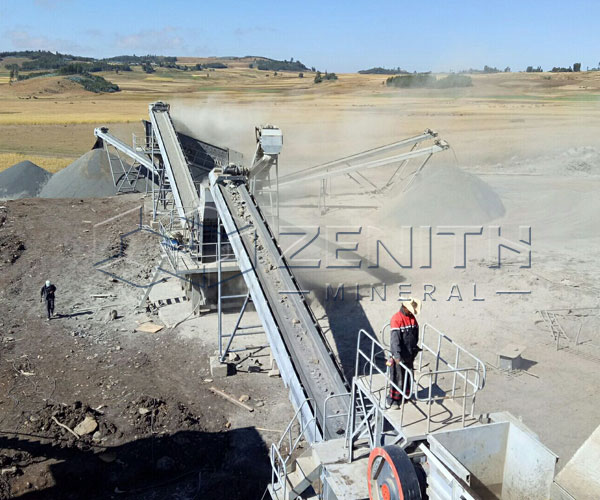
Ethiopia’s mining industry is experiencing rapid growth and requires effective crushing equipment and high crushing technology. Stone crushers are essential to the mining industry and are used for aggregate production, surface mining, recycling construction materials, processing demolition waste, and quarried rock. Stone crushers in Ethiopia are typically used in 200t/h basalt crushing plants.
Stone crushers are an integral part of Ethiopia’s developing mining industry. Zenith provides a complete range of stone crushers for sale in Ethiopia, and all their crushers can be customized according to specific requirements. Stone crushers can be classified based on production needs into primary, secondary, and tertiary crushing machines. Common types of stone crushers for sale in Ethiopia include mobile crushers, jaw crushers, impact crushers, and cone crushers. Impact crushers are often used to crush medium-hard and softer rocks like limestone and can process recycling materials. They offer the advantage of producing end products with excellent particle shape, making them suitable for building projects, road construction, and concrete production.
Basalt is a common raw material processed by stone crushers in Ethiopia, with stone crushing production lines located near Addis Ababa, Bahir Dar, Dire Dawa, and Mekelle. The end products typically range from 0-5mm, 5-10mm, and 10-20mm in size and are applied in road and building construction. Additionally, the cement factories in the country use high-quality limestone, clay, gypsum, and pumice as raw materials for cement production. The construction sector in Ethiopia has a significant share of the industry sector, growing between 10% and 20% annually since 2017 due to increased construction of roads, railways, dams, and residential houses.
Quarrying and stone crushing activities can have considerable effects on environmental quality and human health. These activities may lead to land degradation, loss of plantations, air and noise pollution, and health issues for workers and residents. However, quarrying also has a significant impact on job creation and income generation for stone workers and the surrounding community.
The Ministry of Mines aims to increase the mining sector’s contribution to Ethiopia’s economic growth, with a vision to generate close to US $2.4 billion per year from exports by 2027. The government is also working with traditional miners to boost their production capacity and assist them in accessing credit for modern technologies. Ethiopia has a mining proclamation in place to ensure the sustainable development of minerals. This includes giving effect to the government’s custodianship of mineral resources, promoting socio-economic growth and employment, providing security for investors, and ensuring orderly and sustainable development. The proclamation also requires the submission of an Environmental Impact Assessment study report and a rehabilitation fund for restoring the site upon closure.
Investment in mining is a high priority in Ethiopia, with the mining sector considered a strategic pillar of economic growth. The sector is projected to grow by 33% annually, becoming a backbone of agriculture and a catalyst for industrial growth, job creation, and export earnings. There are opportunities in the production of construction inputs like cement, as national demand is estimated to be 17 million tons per year, while local production only covers 52% of the demand. The demand for cement is projected to reach 100 million tons per year in the next 10 years. Furthermore, Ethiopia’s iron ore reserves are estimated at more than 1.1 billion tons, and the government plans to replace iron and steel imports by producing 3 million tons annually.
Ethiopia is also focusing on coal production to substitute imports. A coal factory in the Dawro Zone, with the capacity to substitute 75% of the country’s imported coal, is nearing operation. The company has the capacity to supply 150 tons of refined coal per hour and aims to supply 3,600 tons of coal product per day. Ethiopia’s processed coal demand is high, averaging 400 million USD.
Stone mining projects aim for effective utilization of material in the region. Crushed stone is a major raw material used in construction, agriculture, and other industries. Stone mines can help sustain the supply of minerals for various purposes, catering to the demand of the local population. These projects can also benefit the local people through direct and indirect employment, as well as the State Government through royalty. The mining of stone is carried out using open-cast semi-mechanized methods with controlled drilling.
We have jaw crushers, impact crushers, cone crushers, sand makers and so on.
Mon - Sun, 0:00 - 24:00
24h Online Service
© Zenith. All Rights Reserved. Designed by
